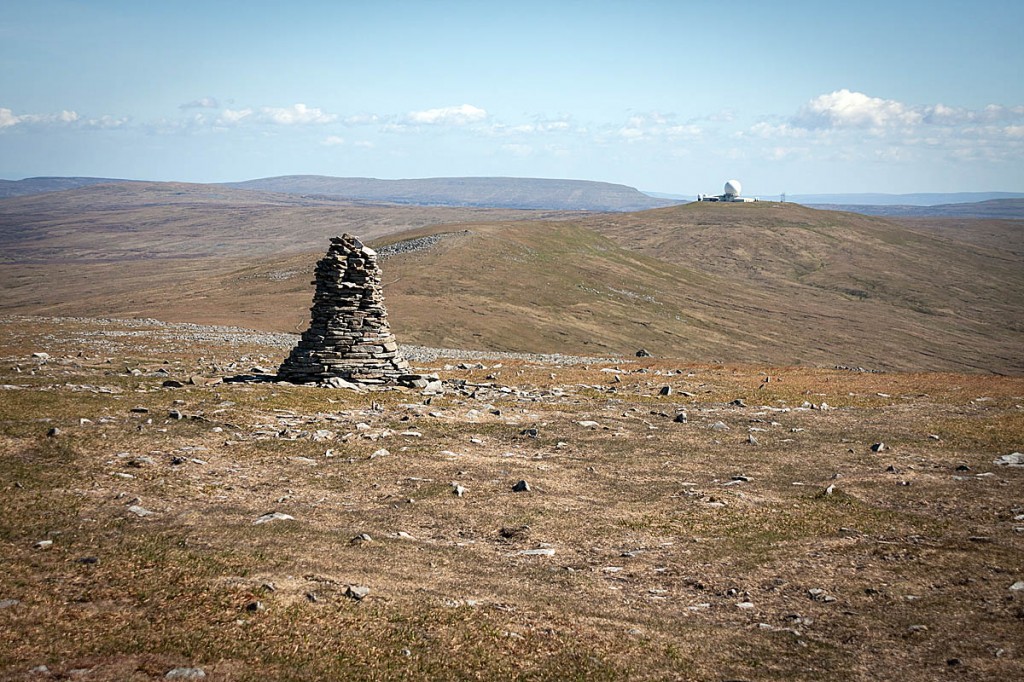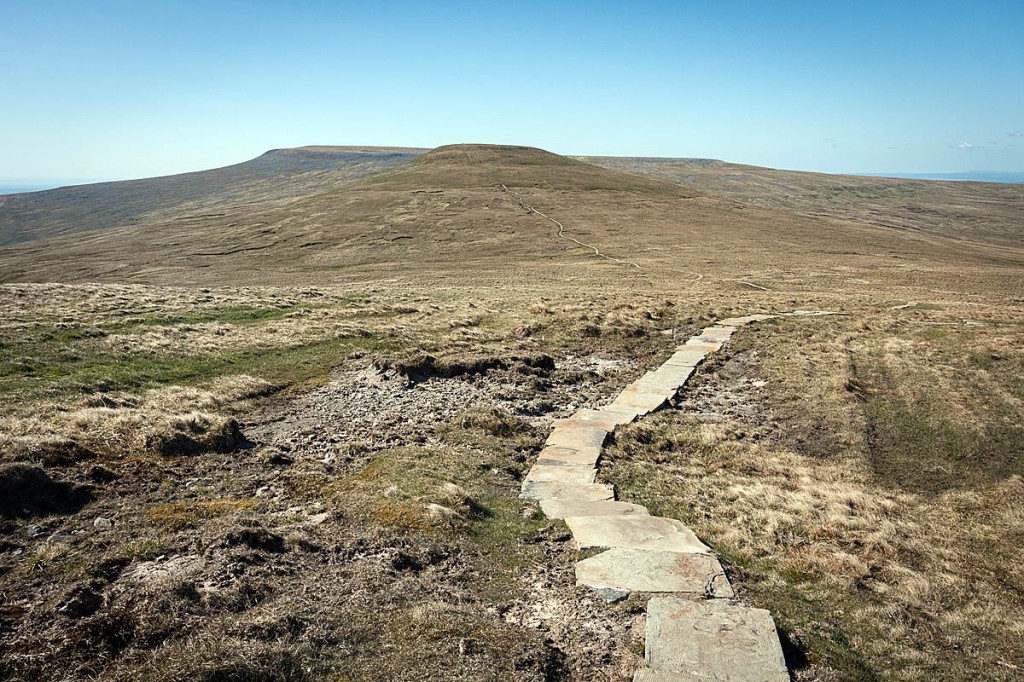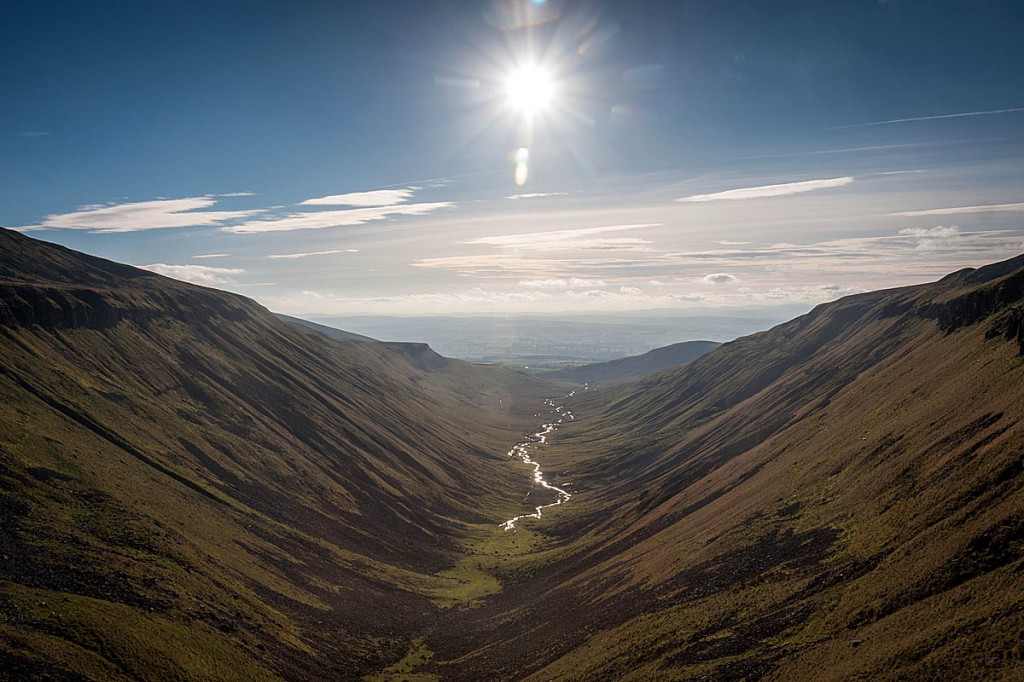
Looking south from the summit plateau of Cross Fell to Little Dun Fell and Great Dun Fell. Photo: Bob Smith/grough
Rescuers in Cumbria have warned of the potential pitfalls of those venturing on to the highest hill in the Pennines.
Cross Fell has its own named wind, encounters more snowy days than some Lakeland fells and is surpassed in height by only seven Lake District Mountains.
Penrith Mountain Rescue Team, which covers the 893m (2,930ft) fell, said it has been called out to the area five times in recent months and Cross Fell and its neighbours are fast becoming its primary area for incidents.
Writing on social media, team leader Rob Holden said “Due to the often extreme weather conditions, lost walkers can quickly develop into hypothermic casualties in desperate need of assistance.
“Cross Fell dominates the skyline in eastern Cumbria, standing guard over the Eden Valley to its West and is clearly visible from many Lake District mountains.
“The Pennine Way runs over the summit of Cross Fell and often draws visitors to the area from all over the world. The section of this walk from Dufton to Garrigill can present a long and challenging journey for the inexperienced hill-goer. The path is sometimes indistinct in poor weather, especially over the summit of Cross Fell, and walkers losing the path can find themselves in peat hags, marshy ground and long, uninhabited valleys stretching away for many miles through wet, difficult and exhausting ground.
“Cross Fell lies at an altitude of 893m within the North Pennines area of outstanding natural beauty and is the highest point on the Pennine Way. If compared to the Lake District fells, it is only exceeded in height by seven Lakes District mountains, being one metre taller than Pillar.
“So it is high, and it is remote, being the largest single area of land above 800m in England. The topography of the land creates the legendary Helm Wind. This is the only named wind in the UK and is most common in late winter and early spring.
“It creates a heavy bank of cloud called The Helm that sits on or above the summit of Cross Fell and can lead to some ferocious winds. The area is in fact characterised by strong winds throughout the year, with the summit often bathed in a raiment of low clouds. The presence of this cloud is a real feature of Cross Fell and it is often covered in mist when all other parts of the Pennines are cloud free.
“Cross Fell has on average 105 days with snow lying on the ground, compared to 83 days on Helvellyn. The average temperature in January is -2C. It is a serious place to find yourself in poor weather and being prepared is essential in ensuring safe passage over the fell.”
Recent callouts for the Penrith team in the area have included a runner cragfast and with hypothermia in low cloud, rain and cold at High Cup Nick; and a couple who lost the path in low cloud, high winds and cold conditions on Cross Fell.
The team also went to the aid of a man who similarly lost the path on Cross Fell in low cloud and rain on a cold day; a couple who lost the path on Great Dun Fell, south of Cross Fell in similar conditions, while walking from Dufton to Garrigill.
A Coastguard helicopter was called in to airlift a 57-year-old man with hypothermia on Cross Fell who had lost the path and was struggling on very wet ground. His adult son, who was with him, was also cold. The pair were unable to move.
The team reminded hill-goers that Greg’s Hut, a shelter on the Pennine Way just north-east of the summit of Cross Fell, is normally open and free to use, but during the coronavirus crisis has been closed to the public.
Mr Holden said: “Many of the incidents Penrith Mountain Rescue Team are called out to on Cross Fell start with errors in navigation. This often leads to extended time out in poor weather, walking in difficult terrain.
“It is essential that when venturing into this area you have a 1:50,000- or 1:25,000-scaled map of the area, a compass and have practised the skills needed to use them.
“Mobile phone mapping software is excellent but is no substitute for a map and compass.
“You need to carefully plan your journey. Ask yourself three questions: do I know what the weather will be like? Do I have the right gear? Do I have the knowledge and skills for the day?

Navigational errors are often the cause of walkers getting into difficulties in the area. Photo: Bob Smith/grough
“At this time of year, you need to carry windproof and waterproof jacket and trousers, hat and gloves, layers of clothing and a spare fleece or belay jacket. A headtorch and map and compass are also essential.
“You need the skills to be able to use the map and compass, being able to walk on a compass bearing in the mist. A spare headtorch, spare gloves and spare compass are also advisable.
“Consider what would happen if someone in your party became injured and were unable to move. We would advise carrying a group shelter – also called a bothy bag. This is an excellent and lightweight safety device that will cocoon your walking group from the worst of the weather until help arrives.
“Cross Fell is a beautiful, rugged, wild, and remote area of England that is a fantastic place to visit. Please do not underestimate it and take all precautions to make sure you stay safe.”
Penrith MRT recommends visiting the Adventure Smart UK website for information on keeping safe on the hills.

M Wood
16 July 2021Beware of the historic pit shafts in the Moors around Cross Fell and the North Pennine fells. While many have been capped people have been injured falling into them, some very seriously. The pit shafts are not always immediately obvious and may be more dangerous than they appear to be.